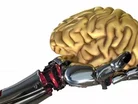Will the healthcare industry welcome artificial intelligence?

In the healthcare sector as well as several other industries, artificial intelligence has been among the most significant technological advances over the past year.
According to a recent report from research firm Frost & Sullivan, consumers will spend over $6 billion on AI tools by year 2021. AI will affect everything from diagnosing illnesses to weight-loss coaching.
RELATED TOPIC: [VIDEO] Will GE Healthcare's ViosWorks technology enhance medical imaging?
The potential for AI technology is off the charts, while the emergence of AI in medical imaging has become more prevalent through IBM’s billion-dollar acquisition of Merge Healthcare.
Its ability to sort and remember information could create new digital doctors.
“Prior to 2015, most of what was happening was sort of academic: pilot programs, exploratory and proof of concept type stuff,” said Venkat Rajan, global director for Frost & Sullivan’s Visionary Healthcare Program. “Now, you’re actually seeing commercial usage.”
RELATED TOPIC: The most progressive health tech innovations driving patient care
While these digital doctors aren’t expected to take jobs away from humans, they will help lighten the workload to ensure real doctors don’t become overly fatigued. They will also be helpful for healthcare facilities that can’t afford a team of physicians with different subspecialties.
In addition, a computer-aided diagnosis can weigh several more factors than a doctor could themselves. This includes review a patient’s entire history quickly while taking risk factors such as age, previous diseases and residence into consideration.
But not every application of medial AI will be for doctors. Some of the innovation will go toward assisting people manage their own health to control chronic conditions such as diabetes.
RELATED TOPIC: IBM’s new billion dollar deal for Merge—How will healthcare change?
One of AI’s benefits is the ability to help patients stay healthy so they don’t need to see a doctor as often.
“It’s one level to make the diagnosis, but it’s another to support the patient,” said Rajan. “The benefit is being able to understand you better and provide better feedback, guidance and support.”
Click here to read the latest edition of Healthcare Global magazine!


